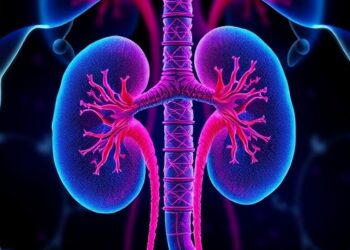A study by researchers at Baylor College of Medicine and the Jan and Dan Duncan Neurological Research Institute (Duncan NRI) at Texas Children’s Hospital, reveals that the protein Tau – a key player implicated in several neurodegenerative conditions including Alzheimer’s disease – also plays a positive role in the brain. Tau mitigates neuronal damage caused by excessive reactive oxygen species (ROS) or free radicals and promotes healthy aging. The study was published in Nature Neuroscience.
A study by researchers at Baylor College of Medicine and the Jan and Dan Duncan Neurological Research Institute (Duncan NRI) at Texas Children’s Hospital, reveals that the protein Tau – a key player implicated in several neurodegenerative conditions including Alzheimer’s disease – also plays a positive role in the brain. Tau mitigates neuronal damage caused by excessive reactive oxygen species (ROS) or free radicals and promotes healthy aging. The study was published in Nature Neuroscience.
“ROS are natural byproducts of various cellular functions in the body. While low levels of ROS are beneficial, excess ROS is harmful to cells as it triggers the production of toxic forms of other molecules that induce oxidative stress, including peroxidated lipids,” said lead author Dr. Lindsey Goodman, a postdoctoral fellow in the lab of Dr. Hugo Bellen. “Neurons are particularly susceptible to oxidative stress and are destroyed if peroxidated lipid levels are not tightly controlled.”
Lipid droplets protect the brain from oxidative damage
There is mounting evidence supporting the notion that our brains have developed multiple neuroprotective strategies to combat ROS-induced oxidative damage.
One of the strategies, discovered in 2015 by the Bellen team, consists of neurons exporting these toxic peroxidated lipids to neighboring glial cells, which sequester them into lipid droplets for storage and future energy production. “This process effectively removes and neutralizes these toxic lipids,” Goodman said. “In the current study we investigated the role of Tau in the formation of glial lipid droplets.”
The team found that endogenous normal Tau in flies is required for glial lipid droplet formation and for protecting against neuronal ROS. Similarly, Tau was required in glial cells obtained from rats and humans to form lipid droplets.
And while expression of normal human Tau was sufficient to restore the process of formation and maturation of glial lipid droplets in flies lacking their own Tau, when this human Tau protein carried disease-causing mutations – which are linked to an increased risk for Alzheimer’s disease – the glia were incapable of forming lipid droplets in response to neuronal ROS.
“This argues that mutations in Tau may reduce the protein’s normal ability to prevent oxidative stress in addition to causing the protein to accumulate into the typical hallmarks of disease, as described by previous work,” said Goodman. “Altogether, the findings support a new neuroprotective role for Tau against the toxicity associated with ROS.”
Further connections with disease were discovered using established fly and rat models of Tau-mediated conditions that overexpress disease-causing human Tau protein in glia. In these scenarios, the investigators again saw defects in glial lipid droplets and glial cell demise in response to neuronal ROS. This demonstrated that Tau is a dosage-sensitive regulator of glial lipid droplets where too much or too little Tau is detrimental.
“By revealing a surprising new neuroprotective role for Tau, the study opens the door to potential new strategies to slow, reverse and treat neurodegenerative conditions,” said Bellen, corresponding author of the work. He is a distinguished service professor in molecular biology and genetics at Baylor and holds a Chair in Neurogenetics at Duncan NRI. Bellen also is a March of Dimes Professor in Developmental Biology at Baylor.
In summary, contrary to its usual ‘bad guy’ role in neurodegenerative disease, this study demonstrates that Tau also plays a ‘good guy’ role in glia by helping sequester toxic lipids, reducing oxidative damage and, hence protecting our brains. However, when Tau is absent or when defective Tau proteins are present, this protective effect disappears, leading to disease.
For the complete list of authors and their institutional affiliations, see the publication.
This work was supported by several grants from the National Institutes of Health, the Canadian Institutes of Health and Research Doctoral Award, Sloan Research Fellowship from the Alfred P. Sloan Foundation, Canada Research Chairs program, a CIHR project grant and a Grant-in-Aid for Scientific Research on Challenging Research (Exploratory). More details on other funding sources related to data collection can be found here.
###
Journal
Nature Neuroscience
Method of Research
Experimental study
Subject of Research
Animals
Article Title
Tau is required for glial lipid droplet formation and resistance to neuronal oxidative stress
Article Publication Date
26-Aug-2024




